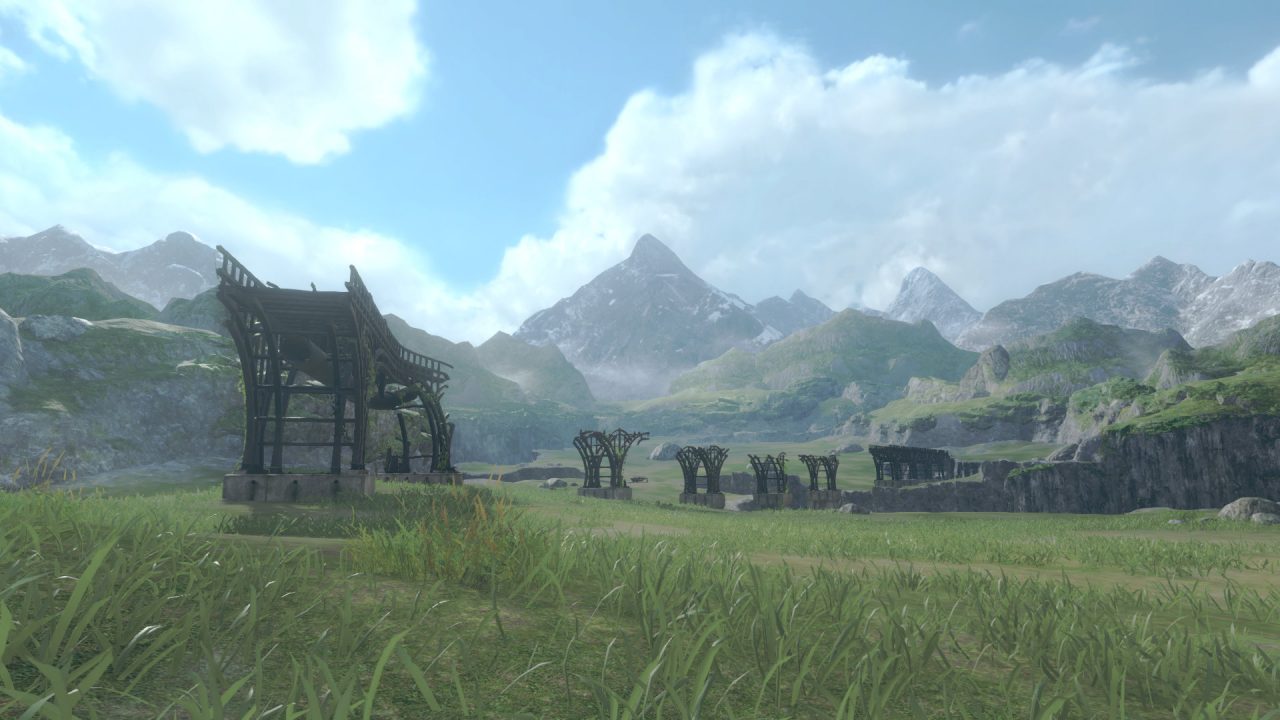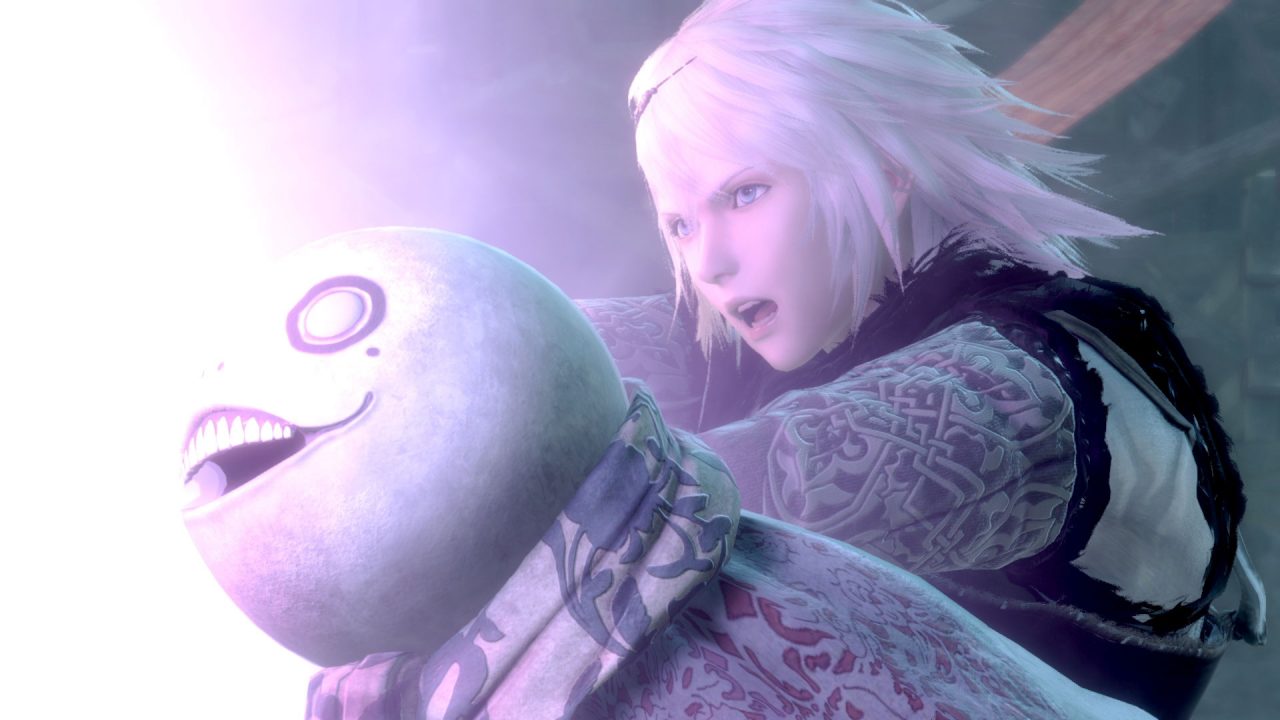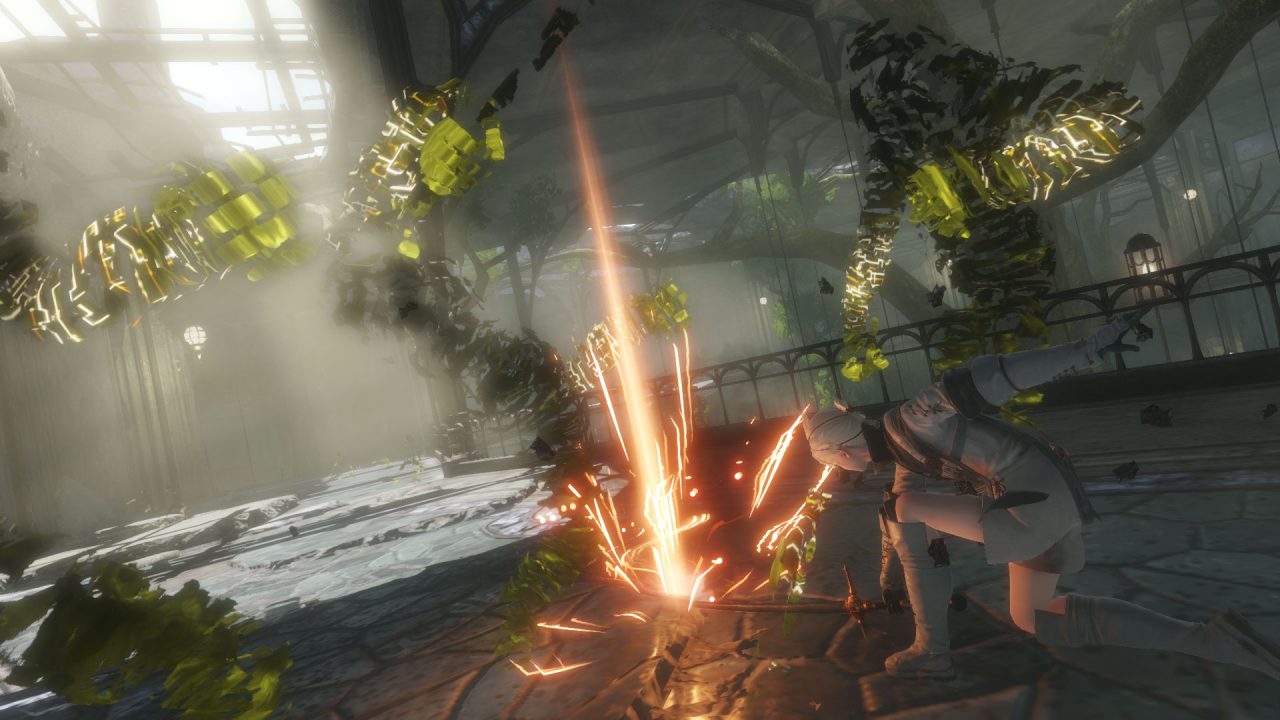See the video version of this review at the end of this page!
In the opening movie to 2017’s NieR: Automata, a gentle hum of music fades in to create a meditative yet uncomfortable ambiance. The soft, exasperated voice of a woman comes in and says, “I never quite realised… how beautiful this world is.” It’s sombre but reflective, sad yet hopeful, and the perfect way to open the game. In contrast, one of NieR Replicant ver.1.22474487139…‘s openings starts with no music and no fade-in, just a black screen with a woman’s voice shouting and swearing. She’s angry, upset, and desperate. There’s no context to the scene, but it’s just as shocking now as it was back in the original release in 2010, and it sets the stage appropriately for a beautifully raw and emotional adventure full of sorrow.
That’s not to say that NieR Replicant isn’t meditative or thoughtful, but if you’re coming into the game expecting Automata, then don’t. As with almost all of Yoko Taro’s games, both explore similar philosophical concepts in ways that make you think constantly, but Replicant is louder, brasher, and much more personal than Automata in that it directly deals with humans and human stories. It still makes you think, but it makes you feel even more. This rerelease gives people who discovered the series through the sequel a chance to experience what happened thousands of years before. While this version cleans up many of the issues that plagued the original NieR, it’s still a messy, at times tedious journey, but a beautiful one.
There are a few significant changes compared to the original Western release 11 years ago. NieR Replicant is based on the Japan-only PS3 game, NieR RepliCant, which focuses on a teenage/young adult protagonist on a quest to fight creatures known as Shades and save his sister, Yonah, from a deadly illness, called the Black Scrawl. The version we got is Japan’s Xbox 360 game, NieR Gestalt (or just NieR here), and instead of a brother, you play as a father who is taking care of his daughter. And to me, it makes more sense for a young boy to be unaware of the world around him and not have a steady job when so many others around him do. His relationship with Yonah is just as tender and loving as it was in the original, and his shift after the time skip from a naive young boy to a compassionate adult, who harbours years of anger and hurt, is more noticeable and effective as a result.
This mood is captured so effectively in the game’s most considerable improvement: the visuals. NieR Replicant runs at a consistent 60fps during action and 30fps in cutscenes, but the transitions between these two frame rates feel jarring on a PS5. Luckily, all of the other enhancements look wonderful, with the new, overhauled character models bringing the game’s aesthetic closer to Automata‘s, and they’re much more pleasing to the eye. And there’s no longer a veneer of misty browns and yellows washed over the world. There are even some subtle redesigns in the backgrounds of areas such as The Lost Shrine and Junk Heap that act as little nods to locations in Automata. The environments are a marked improvement over the original not just because they look better but also because they perfectly complement the story; verdant greens that juxtapose the washed-out greys and rusted browns; the spectacular lighting illuminates patches of the world. Just as you are a force of kindness for your sister and the inhabitants of your village, light and the varied colours bring moments of calm and warmth in an otherwise hostile, cruel world.

It’s this concoction of pain and warmth that makes NieR Replicant an exhausting game to play at times. From the bevy of gameplay styles meshed together to the traumatic events you have to sit or read through, I had to take multiple breaks to soak everything in, have a bit of a cry, or simply take a breath. It’s not the first time I’ve played NieR either, but the re-localised, fully-voiced script and the re-recorded voice lines brought back these same feelings and more, all over again. Joy is so often swept out from under your feet, and quest lines that promise the world end in nothing but tragedy. As Yonah’s sickness worsens, the kind Emil is forced to relive the trauma of his past, and as Grimoire Weiss attempts to bicker with others to lighten the mood, I feel everything these characters are feeling and fell in love with them, and the story, all over again. The world might not accept them for who they are, but the protagonist does, and as a player, I do too.
The story is mostly unchanged, but it’s still just as good as I remembered it. The new localisation has kept all of the critical moments in, from the brazen Kainé’s colourful expletives to many heartrending endgame speeches, and The Recycled World of Vessels DLC is also included (so dad-NieR fans will be happy). A brand new section inspired by one of the short stories in the Japan-only book Grimoire Nier has been worked into the game, too, and it fits in well. But because this is a Yoko Taro game, you have to work hard to get everything, including replaying the second half of the game at least twice. Each time around, you’re drip-fed more information about the world that only serves to enrich the story and make you consider your actions even more. New scenes expand on character relationships and motivations for this rerelease, which made me even more sympathetic to even the “enemy’s” cause. Even if some of the game’s best writing is tucked away in these endings, it’s the exact same locations, sequences, and story beats that lack the nuance or the differences of Automata‘s multiple playthroughs.
All of these emotions were perfectly captured and preserved through Keiichi Okabe’s unparalleled score back in 2010, and NieR Replicant‘s rearrangements do a fantastic job of recapturing this. Walking into the village library, the new version of “Song of the Ancients (Popola)” has a more distinctive bell sound throughout, and it takes on an even more haunting, otherworldly quality because of the new instrumentation. Other tracks like “The Prestigious Mask” have been extended and given more time to breathe. Even if not every arrangement hits perfectly, it’s how the songs are used and the feelings they still capture that make the new interpretations work so well. It’s why “Grandma,” a beautiful piano piece, remains so poignant today. Playing through an intense and emotionally fraught battle with Kainé screaming about how much she hates herself makes me choke up every time. There’s even a few brand-new tracks that are equally brilliant, too.

NieR Replicant‘s combat is one last area that’s improved over the original, but I’ll reiterate something I said earlier: don’t expect Automata. While animations and movements are much smoother, and combat feels snappier, this is still worlds away from the sequel’s level of quality. My favourite, and easily the best, adjustment doesn’t even come until the second half of the game when you have access to three different types of weapons. Now you can quickly swap between the three weapons by using the d-pad. This makes combat feel much more fluid as you no longer need to wade through menu after menu to get the weapon you want. And because different weapons are more effective at attacking quickly or breaking guard, it makes everything feel a bit less clunky.
Outside of this, nothing has really changed, so aside from the game’s spectacular and dramatic boss fights, combat still feels pretty mindless. You can get through most battles by just attacking, dodging, and guarding, with liberal use of the game’s magic when you’re surrounded or have to deal with unreachable enemies, but there’s rarely any strategy to any of the game’s fights. You can enhance weapons and magic with “words” that you randomly pick up from enemies, but the menus feel a little awkward to navigate, and there’s no easy way to manage a few spells and words at a time. You can only grab either every spell or one spell. Fortunately, the combat is the least important part of the game, and I don’t know what else you could do without rebuilding it from the ground up.
It’s all of these little things that make playing NieR Replicant a bit of a struggle at times. What Toylogic has done to improve the game makes it much more tolerable than the original release. However, some issues still stand today, such as the lack of fast travel before the time skip, which makes revisiting locations over and over extremely tedious. There are only a few locations in the game, but traipsing back across the same few fields constantly is boring. Sidequests deliver similar frustrations, requiring you to gather materials with low drop rates or visit the same location multiple times. You can cultivate flowers and food in your garden, and these grow in real-time, but tending to each block of your field square by square, individually, is so slow. And fishing, while better explained this time around, is still frustrating.

And here’s the problem: some of the best parts of Replicant are tucked away through this repetition. Many of the moral questions and weighty dilemmas stem from these weird quests that bring so much personality to the game. Delivering mail to the lighthouse lady is a questline that will stick with me forever, and as I read her letters, it felt like my heart was ready to burst. We do these things to help the people around us, to be kind, to grow as people. Some quests left me with a choice, and I had to sit and consider the consequences of my actions. And when I made that choice, I was wracked over whether it was the right thing to do almost every time. I just wish accessing and carrying out these side stories were handled much better, either with a better map with quest markers or more evident hints or instructions for growing plants or fishing. I recommend everyone does these, but pace yourself accordingly.
There is one final addition to the game that is difficult to talk about, but I can’t really afford not to when I don’t think it works with the rest of the game. This is hidden behind yet another partial replay, and for me, it undercuts a lot of the trauma and growth we’ve experienced playing through the game. It’s just one possible outcome, but I was uncomfortable with how it left things when I thought what we already had was more than good enough.
Regardless of my feelings on the final changes, or at my annoyances at the repetitions, few games touch my soul as deeply as this series does. NieR Replicant ver.1.22474487139… is still an experience that will always stick with me, whether I think my hard work has been rewarded or not. The original 2010 release came with many caveats, and Replicant has softened many while bringing some of its own, but this is a game that makes me think and feel more than most others. It’s tedious, mindless, and even frustrating at times, but this rerelease makes a peculiar, melancholy and beautiful game much easier to recommend.
This review was originally published on April 22, 2021. It was re-published to include the video version above.



